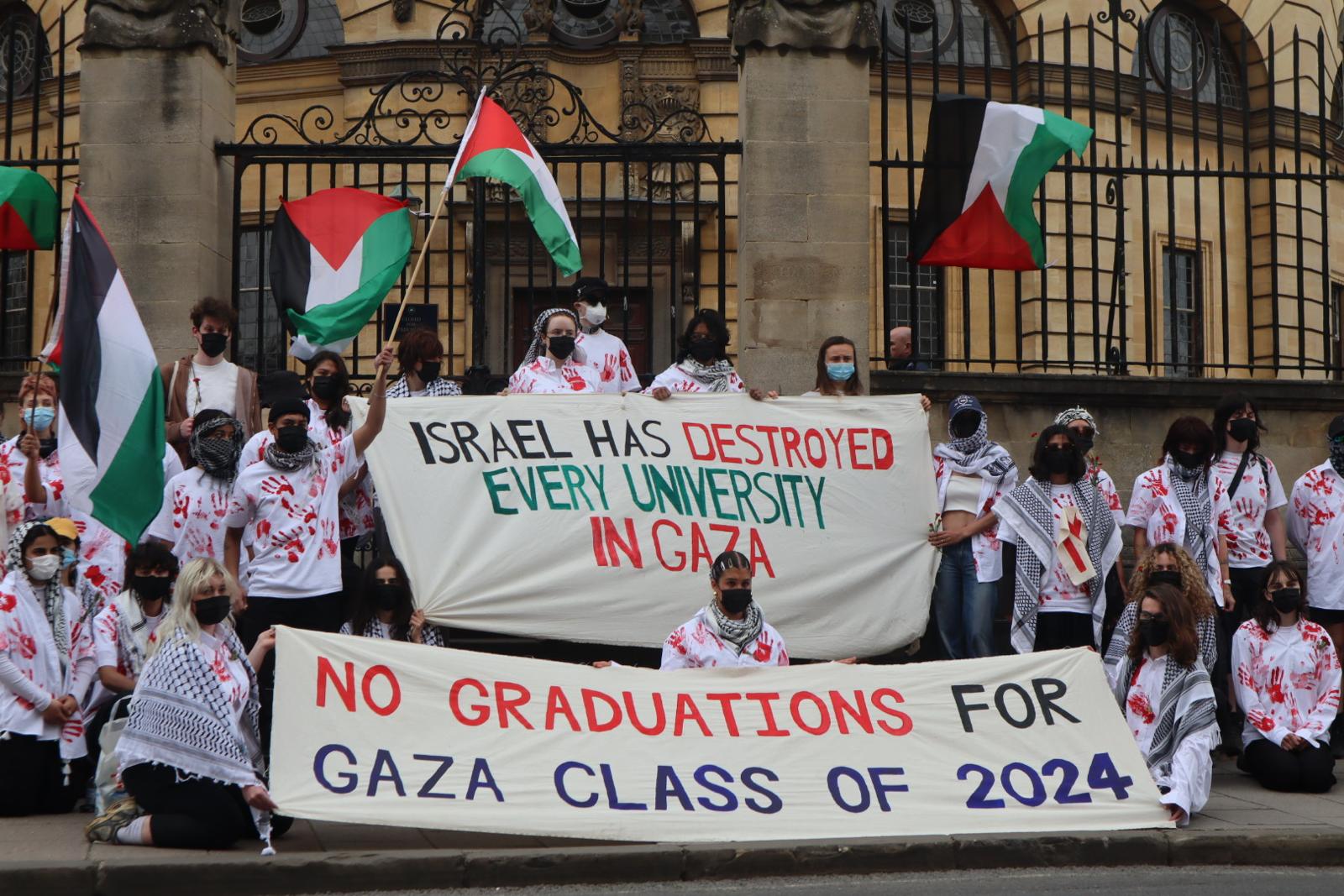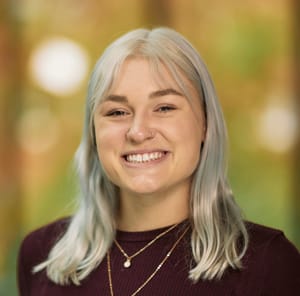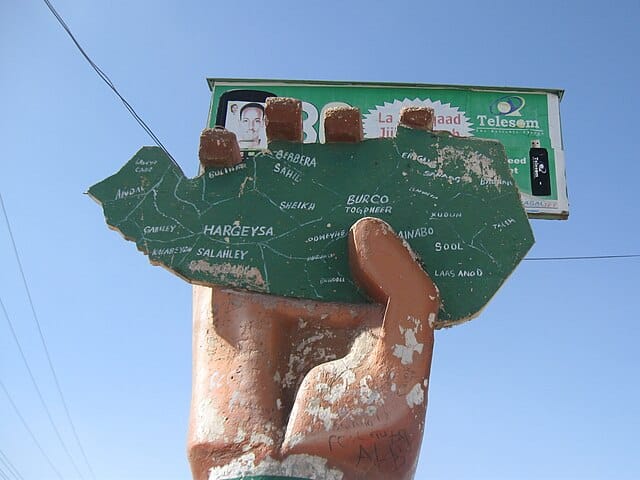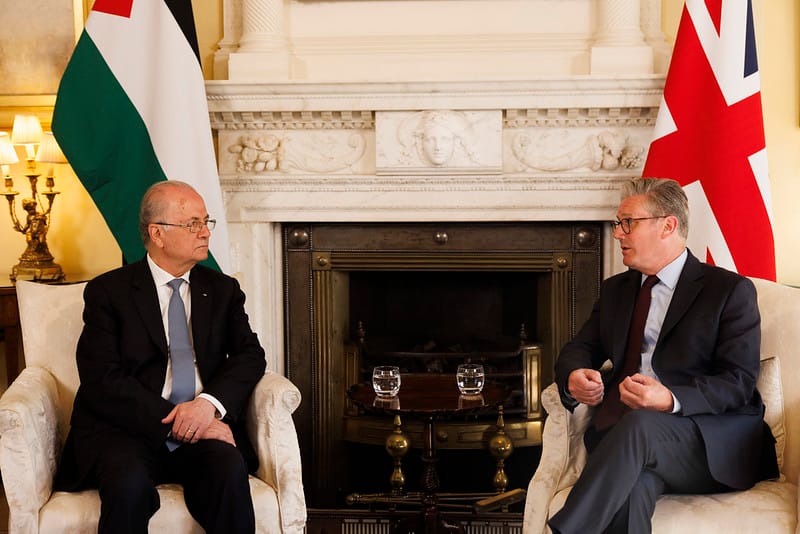Campus Dispatch II
It is the end of term at the University of Oxford, but the university’s Palestine solidarity encampment operates on a different timeline.

Today marks the final day of the official University of Oxford academic calendar. But more significantly, today is the 251st day of genocide and the 76th year of Nakba. For us – the students of the Oxford Action for Palestine (OA4P) solidarity encampment – it is the 40th since we began sleeping in tents outside the university’s Pitt Rivers Museum, a site chosen as a reminder of the university’s ongoing ties to the British empire. Two weeks after the start of our action, we escalated with a second encampment, located at the central Radcliffe Camera library. Our aims remain unchanged: we demand full financial disclosure, divestment from all arms companies and companies complicit in the Israeli occupation, an overhaul of the university’s ethical investment policy, boycott of institutional relationships with Israeli universities, an end to the university’s contract with Barclays, and a commitment to a Palestinian-led rebuilding of Gazan higher education.
At this time, we have yet to enter formal negotiations with the University of Oxford’s administration, though we have finally begun initial dialogue surrounding the content of our demands. To say that we are disappointed by the university’s unwillingness to extricate itself from crimes against humanity is an understatement. And we are perturbed by the assumption that our action will only exist within the confines of an academic calendar, when genocide has no boundaries, no barriers, no term cards or finals.
Yesterday, a group of students unaffiliated with the Oxford Action for Palestine encampment occupied the Examination Schools building, thereby preventing Oxford students from undertaking their finals. This is the second occupation in Oxford since the beginning of the encampment; the first led the University to call the police on its own students and engage in a brutal crackdown on protestors. The same did not occur for this second occupation, and instead, the students left the building after striking a deal in the later hours of Thursday evening. What is clear is that the students at the University of Oxford refuse to abide by the terms of normalcy during a genocide. Treating the end of term as a milestone seems futile while the bombs continue to fall and students continue to pressure the university, both inside of large action groups such as OA4P and outside of them. The encampment is only one pillar of our movement for Palestinian liberation, and our efforts to demand an end to the University of Oxford’s complicity in genocide did not begin and will not end with the tents on its lawns.
The day-to-day of encampment life includes a variety of events, but we almost always host a teach-in on subjects ranging from the principles of thawabit (“demands on which there can be no compromise”) to the work of Edward Said to homonationalism, pinkwashing and more. On other days, we host tatreez and zinemaking workshops, poetry readings, film screenings, welfare sessions and community days with Parents for Palestine. We serve meals twice a day, almost always provided by a member of the local community, without whose support we would not have lasted a day. Most evenings, we host a community check-in and forum, where members of OA4P have the opportunity to air concerns and create proposals for the future of the camp. On an individual level, our days vary as we jump between strategy meetings and preparation for discussions with the administration, frantically write public statements in the late hours of the night about breaking events, and ensure that all of our community members have access to food and water and a place to sleep.
Every Friday, we hold a Shabbat service, led by Jewish students, faculty and staff who support the encampment. Last week, we had a fiddle accompany our rendition of Shalom Aleichem, before breaking home-baked challah, covered in a red keffiyeh. For the past two weeks, we’ve held community evensongs, where we have honoured the martyrs through song - one of which is an original composition of If I Must Die by Refaat al-Areer, written and scored by a member of the camp community. After the evensong, the camp bursts out into an open song-sharing space, where we repurpose the encampment’s sound system, playing Dammi Falastini and, inevitably, organising a mass dabke circle. The only absolute constant from the beginning has been our nightly vigil, where we read the stories of the lives and deaths of Palestinians who have been brutally murdered in the genocide. In doing so, we re-centre why we are here and resolve to continue resisting our university’s complicity.
As Israel fires on safe zones and posts on social media that there are “no innocent civilians”, we know that we cannot stop. Last Saturday morning, I was on my way to a meeting with the fellow negotiators when my phone erupted with notifications about the massacre in the Nuseirat refugee camp. While walking down Oxford’s High Street, I responded to messages from a contact in Gaza, who described sitting down for breakfast when suddenly the tanks started firing. When I arrived at the meeting, we all sat in silence and embraced for a moment, registering the unfolding horror.
Those of us in the Oxford encampment – and students around the world undertaking similar actions – are not counting the weeks of term, but instead, the deaths that continue to mount, the hours under drones and quadcopters, the buildings razed to the ground. Our timeline is not the academic calendar, and our rhythms are rightfully out of sync with the pace of the university – and world – around us.
Kendall Gardner is an editor at Vashti and a doctoral candidate in political theory at the University of Oxford.
There’s no corporation or big advertisers behind Vashti – we're a workers' cooperative and rely on small donations to keep running. Support our journalism to help break the consensus.
To donate once, click here. To donate monthly, click here.
Author

Kendall Gardner is an editor at Vashti and a doctoral candidate in political theory at the University of Oxford.
Sign up for The Pickle and New, From Vashti.
Stay up to date with Vashti.



